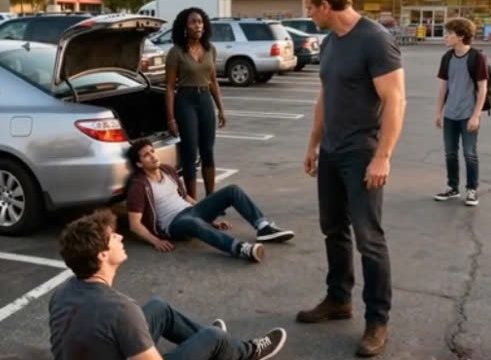All my life I was told to “be the bigger person,” but in my family those words were never about fairness or maturity. They were code for “give Madison whatever she wants so she won’t throw a tantrum.” Madison is my cousin, but because our mothers are sisters and we grew up just a few blocks apart, we were raised almost like siblings.

We spent countless afternoons together, shared meals, and even shared bedrooms when babysitters were needed. The problem was, Madison never learned the meaning of sharing. From childhood it was always one-sided. If I bought a new sweater, she would “borrow” it and return it with ketchup stains. If I saved up for a makeup palette, she would use it recklessly, drop it, and break it. My headphones disappeared more than once and reappeared cracked or buzzing in one ear. Every time I objected, my Aunt Denise dismissed me with the same line: “She’s younger, Carmen, just let her have it.” So I gave in, again and again, because keeping the peace seemed easier than fighting. By the time I was in my mid-twenties, I learned not to expect fairness from my family and instead focused on my own goals. One of the biggest was saving for a car.
I worked weekdays as a receptionist and picked up weekend catering shifts. Each paycheck brought me closer until eventually I signed the papers for a lease-to-own car. It was an older model with more miles than I wanted, but it was mine. No one bought it for me, no one co-signed, and no one helped with the payments. I had earned it alone. The pride I felt sitting behind the wheel was indescribable, and I promised myself I would protect it and never let anyone else drive it. That promise was tested sooner than I expected. Just days before Madison’s eighteenth birthday, she sent me a text that wasn’t a request but a demand: “Hey, I’m borrowing your car this weekend.
It’s my birthday, so mall, spa, everything. Don’t even try to say no!” I laughed bitterly at her audacity. She had barely learned to drive, and given her track record with my things, there was no way I would hand over my car. I texted back firmly: “Sorry, Madi. My car is mine. I’ll need it for work this weekend.” Her response was immediate and predictable: accusations of selfishness, dramatics about her ruined birthday, and a flood of eye-roll emojis. But for once I didn’t back down. I told her if she wanted a car she could save for one the way I did. I put down my phone, convinced the matter was over. It wasn’t. On Saturday morning I opened my blinds and froze.
My car was draped in toilet paper, with streams of white hanging from the mirrors and trees. Worse, yolks and shells from dozens of eggs dripped down the windshield and seeped into the seams of the doors. In the summer heat, the egg was already baking into the paint. My stomach dropped. Security footage confirmed what I already knew: Madison, wearing a glittery birthday sash, and her friends had gleefully pelted my car while filming the whole thing. I called her, hoping she would feel remorse, but she brushed me off. “You got what you deserved,” she said coldly. “If you’d just let me take it, this wouldn’t have happened. It’s just eggs—hose it off.”
When I pointed out the damage was permanent, she laughed and hung up. Minutes later Aunt Denise called to scold me for “overreacting” and reminded me once again to “be the bigger person.” My uncle chimed in too, calling me pathetic for wanting an eighteen-year-old to face consequences. But this time I refused to bend. At the body shop, the service advisor explained that eggs are acidic and had etched into the clear coat. The estimate: nearly $2,500. I sent the bill to Madison’s parents, giving them the option to pay outright or have Madison work it off. Their answer was blunt: “We’re not paying a dime. Grow up.” So I finally did what I should have done years ago—I filed a police report.
The fallout was swift. Because Madison had committed the vandalism on her eighteenth birthday, she was charged as an adult. Her parents raged, and Madison posted teary videos online painting herself as the victim of a toxic cousin. Strangers offered her sympathy, ignoring the destruction she had caused. In court, I finally had the chance to speak. I explained that this wasn’t about a prank but a lifetime of entitlement and disregard. For years I was told to be quiet and forgiving. This car represented independence, sacrifice, and responsibility. Madison destroyed it simply because I dared to say no. The judge listened and then ruled: six months’ probation, forty hours of community service, repayment of my deductible, and a written apology.
It wasn’t everything, but it was something. For once Madison had to face consequences. Weeks later an apology letter arrived, clearly written under pressure, but it was the first time she admitted she was wrong. Slowly the court-ordered payments came, and eventually my car was repaired. One weekend I drove it to the farmer’s market, the paint gleaming under the sun, and realized something profound.
This was never just about a car. It was about reclaiming my voice. For years I had been silenced, told to be the bigger person while others excused bad behavior. But boundaries mean nothing if you don’t enforce them. That day, as I slid behind the wheel, I finally felt lighter. Madison may never change, but I had. I understood at last that peace built on silence isn’t peace at all. Sometimes you have to draw a line, and once you do, everything shifts.





